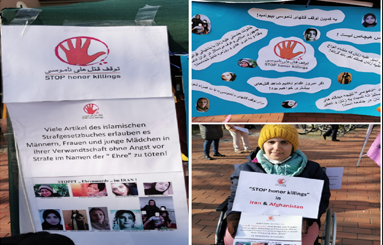The Killing of Maryam Over Suspicion
By :Rezvan Moghaddam
A year after Maryam’s death, news of the case was finally published in Iranian media.
According to reports, in mid-1403 (2024), Maryam’s father contacted the police to report
the killing of his daughter. Maryam had been stabbed to death. Further investigation
revealed that Maryam had divorced her first husband and had a young daughter, and
later married a man named Naser, who played a role in her killing.
During initial interrogations, the perpetrator not only confessed to killing Maryam but
also claimed that he had acted out of suspicion toward his wife, an excuse frequently
used in cases of violence against women to conceal the crime.
The case was further examined in Branch 11 of the Criminal Court, where the killer
again insisted that his suspicion about Maryam’s behavior justified his actions. He
claimed she had communicated via text messages (not phone calls) with unknown
individuals, and alleged she had ignored him. Such claims are common in cases of
violence against women, where misogynist men invoke “honor” as a way to escape
punishment, a loophole created by patriarchal laws and social norms.
However, the records of Maryam’s messages proved the opposite. The printouts
showed that she had communicated respectfully and warmly with her husband, often
addressing him affectionately as “dear.” The judge confirmed that the messages
reflected respect and cordiality. The killer attempted to misrepresent a single message
that included their home address as evidence of Maryam’s supposed communication
with strangers, a claim the court completely rejected.
This case clearly illustrates how patriarchal and reactionary laws facilitate the killing of
women. Misogynist men, aware of laws that implicitly condone “honor” killings, attempt
to portray women as “deserving of death” to avoid punishment.
Moreover, most media outlets frame such crimes as “family disputes,” deliberately
ignoring the systemic control over women’s bodies and producing misleading statistics.
According to a report by HRANA, in 1403 (2024), at least 158 women were killed, with
125 deaths labeled as “uncertain reasons” or “family disputes,” and 33 reported as
“honor killings.” The term “family murder” is misleading because it minimizes the crime
to a private or domestic conflict, obscuring the deep-rooted structural violence against
women.
Many of these killings are fundamentally about controlling women’s bodies, yet they are
reported under various justifications.
Statistics from HRANA are not fully comprehensive; according to the Stop honor Killings
Campaign, in 1402 alone, 187 honor killings were documented, with full analysis
publicly available on the campaign’s website.
#StopHonorKillingsCampaign
#SafetyForWomen
#WomenHaveTheRightToLive
#IslamicRepublicResponsibleForWomenKillings
#NoToViolenceAgainstWomen
#SuspicionAsMotive
#NoToMisogynistCulture
Follow news in the Stop honor Killings Campaign Telegram group:
https://t.me/stophonorkilling
Support the Stop honor Killings Campaign with Your Donations via PayPal:
https://paypal.me/stophonorkillings?country.x=US&locale.x=en_US
Stop honor Killings Campaign


















